SEO
Get To Know Google’s Before: and After: Search Operators

Google offers a lesser-known advanced search command that could make your Google searching a whole lot easier.
While it’s possible to use Google’s Tools menu to do the same thing, it takes six clicks to do what advanced search operators accomplish with one click.
Advanced Search Operators
Advanced search operators (otherwise known as search commands) are ways to refine your search in order to get a more specific result.
For example, if you want search results from a specific website, you can use the site: search operator.
Example of the site search operator:
apples site:example.com
The above search will return all webpages on the example.com website that contains the word “apple” in them.
Now, here is how to do the same search, but this time we want to find results about “apple” but not from example.com.
To do that, we do the same search but with the minus sign (-).
Example of site exclusion search operator:
apple -site:example.com
Before: And After: Search Operators
The advanced search operators that Google introduced in 2019 are called the before: and after: commands.
What these search commands do is make it easier to find webpages that are published within a specific period of time.
These kinds of time-based searches help a user to find webpages that were published during a specific time period.
There was already a way to accomplish this time-based task by using an advanced search tool available on Google’s home page.
But, using those tools takes six clicks to accomplish a time-based search.
The old way to do it is to first click on the Tools button located below and to the right of the search box:

Then, the next step is to click the “Any time” link.
 Screenshot by author, May 2022
Screenshot by author, May 2022
The third step is to enter a custom date range in the pop-up calendar box.
 Screenshot by author, May 2022
Screenshot by author, May 2022
That’s a lot of typing and clicking in order to search for a document that was published within a specific time frame.
The New Way To Accomplish Time-Based Searches
The new way to search is similar to using the other advanced search operators, like the “site:” search operator example above.
The before and after search commands look like this:
before: after:
These are examples of how to use the before and after search commands:
spider man before:2005 spider man after:2005 spider man after:2005-01-01 before:2019-31-12
Note: If you’re using the full dates, the search has to be done in the year/month/day format.
 Example of spider man before:2005
Example of spider man before:2005
 Example of multiple calendar dates
Example of multiple calendar dates
What The Before & After Search Operators Mean
The advanced search operator “before:2019” means before 01/01/2019.
This is a screenshot of a search using the “before:” advanced search operator:
 Screenshot from search, Google, May 2022
Screenshot from search, Google, May 2022
Notice how the above search result has a date of November 16, 2018? That’s because Google is returning webpages from before 01/01/2019.
This is the same search but restricted to results from before 2018:
 Screenshot from search, Google, May 2022
Screenshot from search, Google, May 2022
Similar to the previous search, what Google is doing with the “before:2018” search operator is returning webpages that were published before 01/01/2018.
How Dashes And Slashes Work
Something that’s really cool is that both a dash (-) and a slash (/) in the date also work.
So for this search:
avengers endgame after:2019/03/01 before:2019/03/05
You get this search result:
 Screenshot from search, Google, May 2022
Screenshot from search, Google, May 2022
Time-Based Search Operators Are Flexible With Numbers
Another useful feature is that when entering a date, it doesn’t matter if single digits are written with or without a zero.
This:
07
Works the same as this:
7
Are Dates Sometimes Wrong?
The publication date of the search result pages will not always be shown.
This was the case in 2019 when the before and after search commands were announced, and this continues to be the case today as of the publication of this article.
Also, sometimes there are search results that don’t seem to match.
For example, for the Spider-Man search like this:
spider man after:2005-01-01 before:2019-31-12
The search results should be no later than December 31, 2019.
But, if you look at the example below, there’s a result from 2021. Is the search operator broken?
Wrong Search Result?
 Screenshot by author, May 2022
Screenshot by author, May 2022
The above search result is not broken. The above search result from the IMDB website appears to be from 2021, but that page was originally published in 2019.
 Screenshot of Archive.org Cache of 2019 IMDB Spider-Man Page
Screenshot of Archive.org Cache of 2019 IMDB Spider-Man Page
So, although the current webpage appears to say that it was published in 2021, the actual publication date was in late 2019 (as seen in the cache saved by Archive.org), when the IMDB created the webpage for the (at the time) untitled movie, that eventually came to be known as Spider-Man No Way Home.
Before & After Works In Google News
The date-based search operators also work in Google News.
This should make it easier to research news reports from specific date periods.
For example, WordPress is updated to version 6.0 (named Arturo) in late May 2022.
If I search Google News for WordPress Arturo from before 2022, Google news returns search results where the words WordPress and Arturo are on the news site. But nothing about the WordPress 6.0 Arturo update.
But, if I search for WordPress Arturo for the dates after March 2022, I get the news search results about the WordPress update.
Google News search like this:
wordpress arturo after:2022-03-01
Returns the correct search results:


Before And After Dates Are Considered Estimates
At the time that the search operators were announced, Google’s Danny Sullivan said that it’s possible that Google might not get it right because it’s sometimes difficult to parse the actual publication date.
So, it was said at the time that the publication dates of search results that used the date-based search operators were to be understood as more of an estimate.
But as is seen with a little digging around, some of what appears to be mistakes in the date range are actually correct. It’s just that the articles were subsequently updated.
Save Time With The Before And After Search Operators
I have to admit that I have forgotten about the before and after search operators. I’ve never seen anyone talk about them since the announcement of these search operators.
Nevertheless, searching with date restrictions is a useful way to search, and it’s a good idea to become reacquainted with these search operators.
Citation: Read the tweet by SearchLiaison that announced the before and after search operator.
More Resources:
Featured Image: Golden Dayz/Shutterstock
!function(f,b,e,v,n,t,s)
{if(f.fbq)return;n=f.fbq=function(){n.callMethod?
n.callMethod.apply(n,arguments):n.queue.push(arguments)};
if(!f._fbq)f._fbq=n;n.push=n;n.loaded=!0;n.version=’2.0′;
n.queue=[];t=b.createElement(e);t.async=!0;
t.src=v;s=b.getElementsByTagName(e)[0];
s.parentNode.insertBefore(t,s)}(window,document,’script’,
‘https://connect.facebook.net/en_US/fbevents.js’);
if( typeof sopp !== “undefined” && sopp === ‘yes’ ){
fbq(‘dataProcessingOptions’, [‘LDU’], 1, 1000);
}else{
fbq(‘dataProcessingOptions’, []);
}
fbq(‘init’, ‘1321385257908563’);
fbq(‘track’, ‘PageView’);
fbq(‘trackSingle’, ‘1321385257908563’, ‘ViewContent’, {
content_name: ‘google-commands-before-after’,
content_category: ‘seo’
});
SEO
HARO Has Been Dead for a While
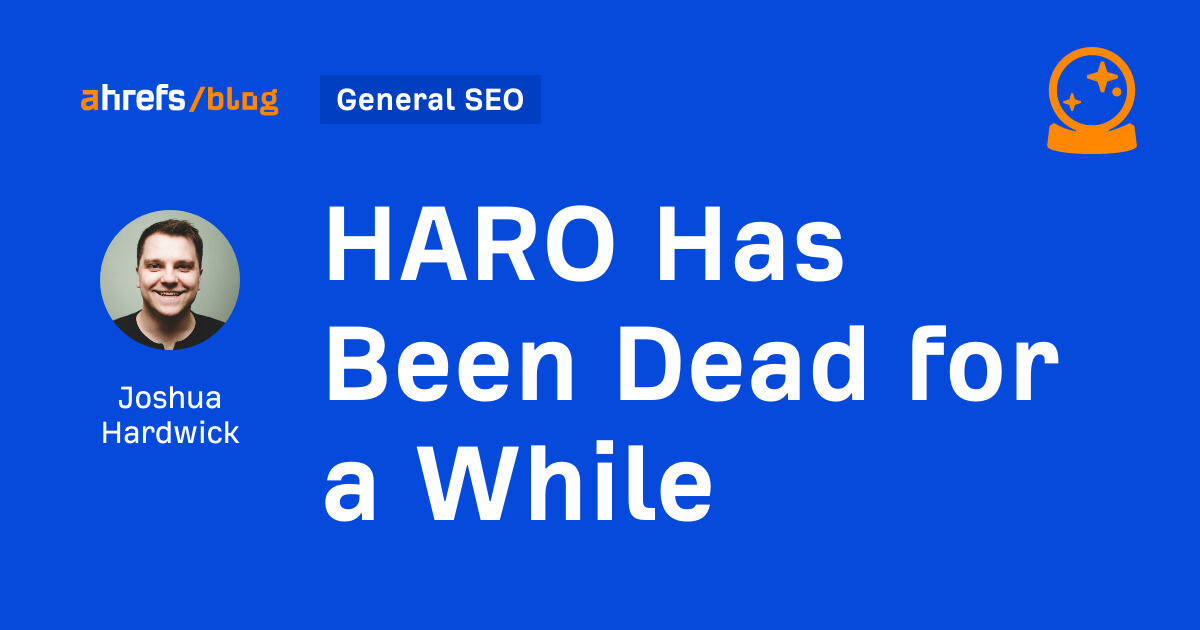
I know nothing about the new tool. I haven’t tried it. But after trying to use HARO recently, I can’t say I’m surprised or saddened by its death. It’s been a walking corpse for a while.
I used HARO way back in the day to build links. It worked. But a couple of months ago, I experienced the platform from the other side when I decided to try to source some “expert” insights for our posts.
After just a few minutes of work, I got hundreds of pitches:
So, I grabbed a cup of coffee and began to work through them. It didn’t take long before I lost the will to live. Every other pitch seemed like nothing more than lazy AI-generated nonsense from someone who definitely wasn’t an expert.
Here’s one of them:
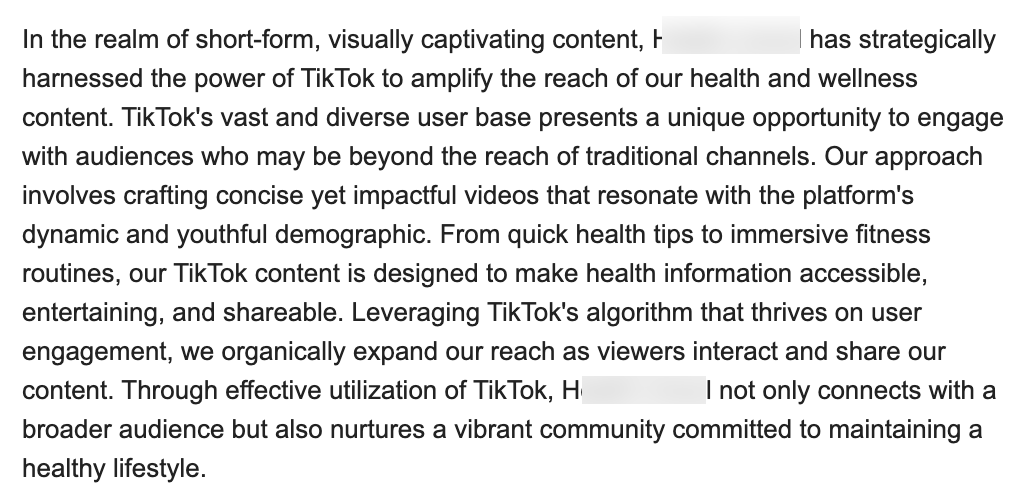

Seriously. Who writes like that? I’m a self-confessed dullard (any fellow Dull Men’s Club members here?), and even I’m not that dull…
I don’t think I looked through more than 30-40 of the responses. I just couldn’t bring myself to do it. It felt like having a conversation with ChatGPT… and not a very good one!
Despite only reviewing a few dozen of the many pitches I received, one stood out to me:


Believe it or not, this response came from a past client of mine who runs an SEO agency in the UK. Given how knowledgeable and experienced he is (he actually taught me a lot about SEO back in the day when I used to hassle him with questions on Skype), this pitch rang alarm bells for two reasons:
- I truly doubt he spends his time replying to HARO queries
- I know for a fact he’s no fan of Neil Patel (sorry, Neil, but I’m sure you’re aware of your reputation at this point!)
So… I decided to confront him 😉
Here’s what he said:
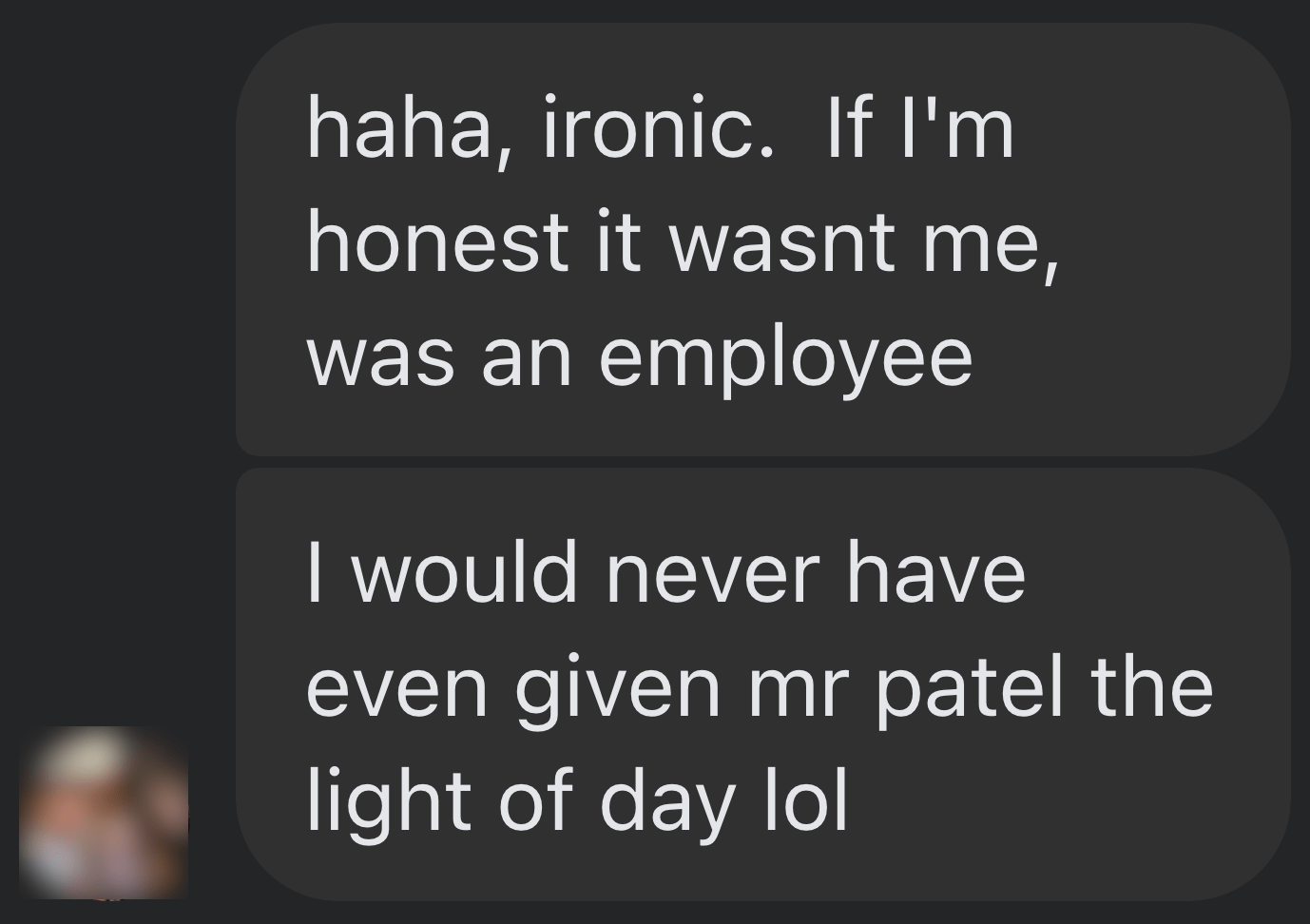

Shocker.
I pressed him for more details:
I’m getting a really good deal and paying per link rather than the typical £xxxx per month for X number of pitches. […] The responses as you’ve seen are not ideal but that’s a risk I’m prepared to take as realistically I dont have the time to do it myself. He’s not native english, but I have had to have a word with him a few times about clearly using AI. On the low cost ones I don’t care but on authority sites it needs to be more refined.
I think this pretty much sums up the state of HARO before its death. Most “pitches” were just AI answers from SEOs trying to build links for their clients.
Don’t get me wrong. I’m not throwing shade here. I know that good links are hard to come by, so you have to do what works. And the reality is that HARO did work. Just look at the example below. You can tell from the anchor and surrounding text in Ahrefs that these links were almost certainly built with HARO:
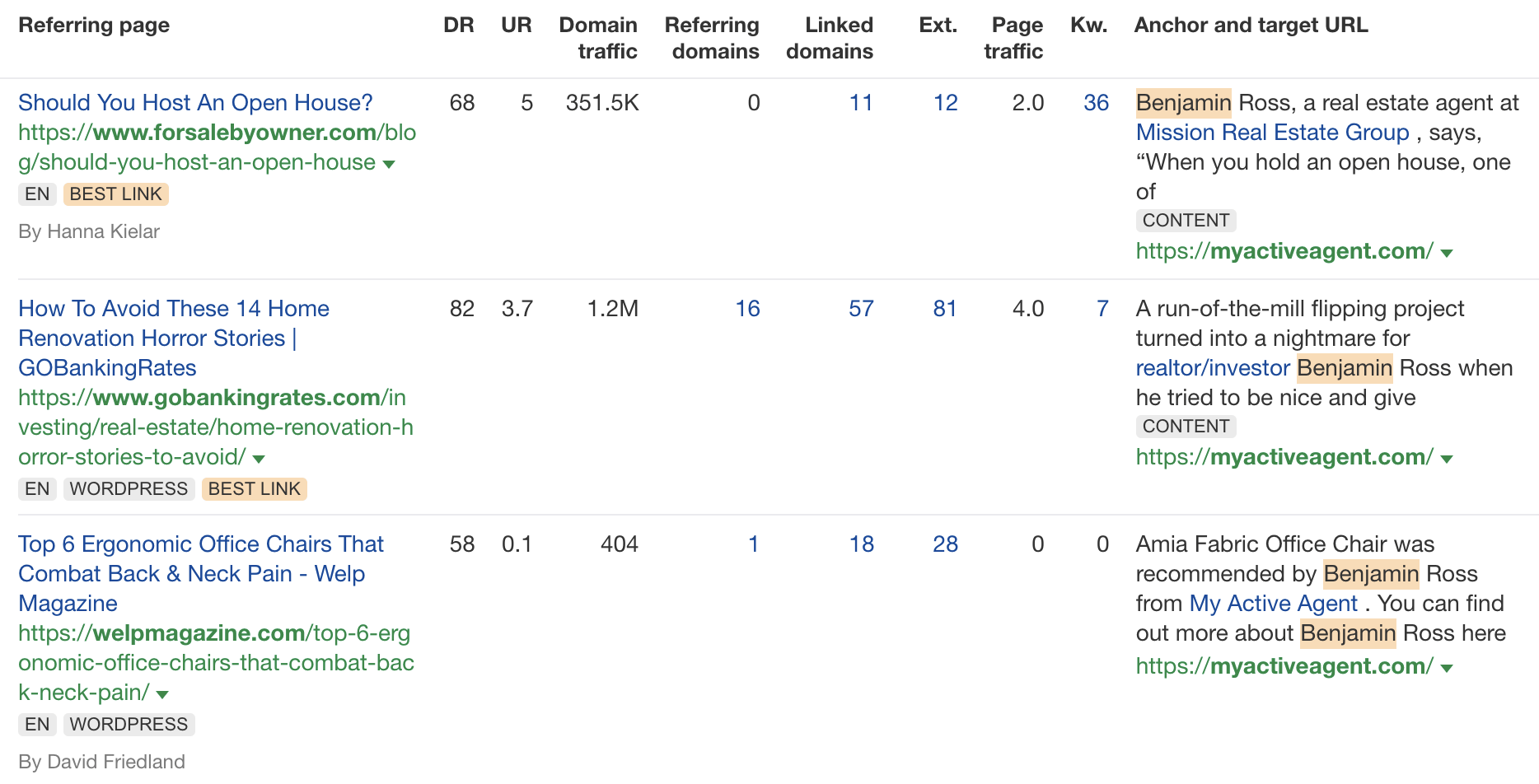

But this was the problem. HARO worked so well back in the day that it was only a matter of time before spammers and the #scale crew ruined it for everyone. That’s what happened, and now HARO is no more. So…
If you’re a link builder, I think it’s time to admit that HARO link building is dead and move on.
No tactic works well forever. It’s the law of sh**ty clickthroughs. This is why you don’t see SEOs having huge success with tactics like broken link building anymore. They’ve moved on to more innovative tactics or, dare I say it, are just buying links.
Sidenote.
Talking of buying links, here’s something to ponder: if Connectively charges for pitches, are links built through those pitches technically paid? If so, do they violate Google’s spam policies? It’s a murky old world this SEO lark, eh?
If you’re a journalist, Connectively might be worth a shot. But with experts being charged for pitches, you probably won’t get as many responses. That might be a good thing. You might get less spam. Or you might just get spammed by SEOs with deep pockets. The jury’s out for now.
My advice? Look for alternative methods like finding and reaching out to experts directly. You can easily use tools like Content Explorer to find folks who’ve written lots of content about the topic and are likely to be experts.
For example, if you look for content with “backlinks” in the title and go to the Authors tab, you might see a familiar name. 😉
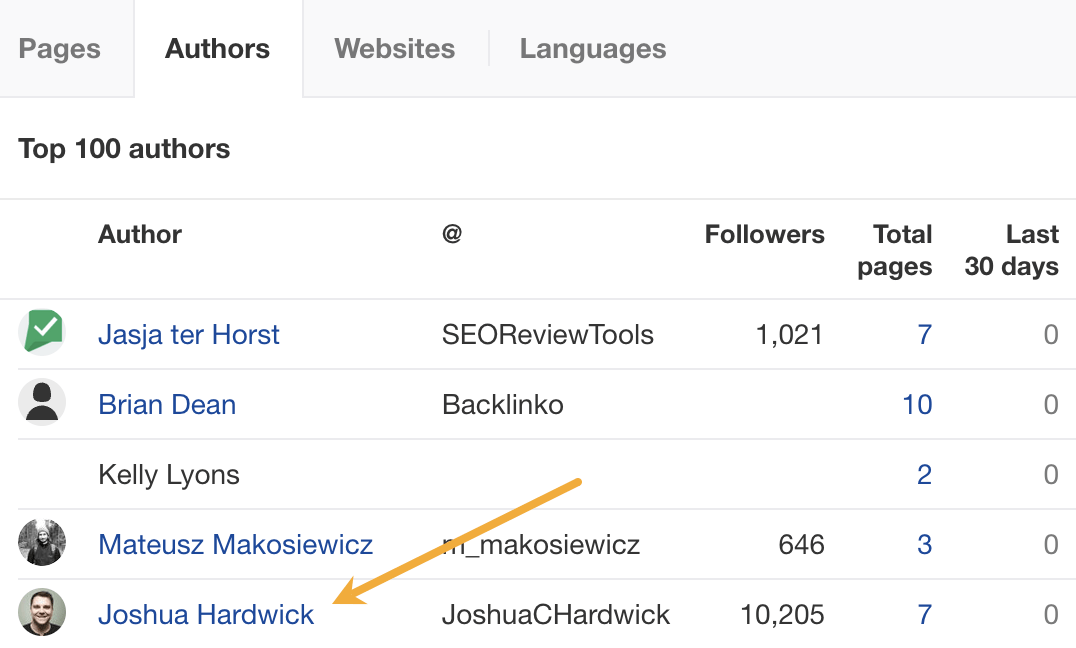

I don’t know if I’d call myself an expert, but I’d be happy to give you a quote if you reached out on social media or emailed me (here’s how to find my email address).
Alternatively, you can bait your audience into giving you their insights on social media. I did this recently with a poll on X and included many of the responses in my guide to toxic backlinks.
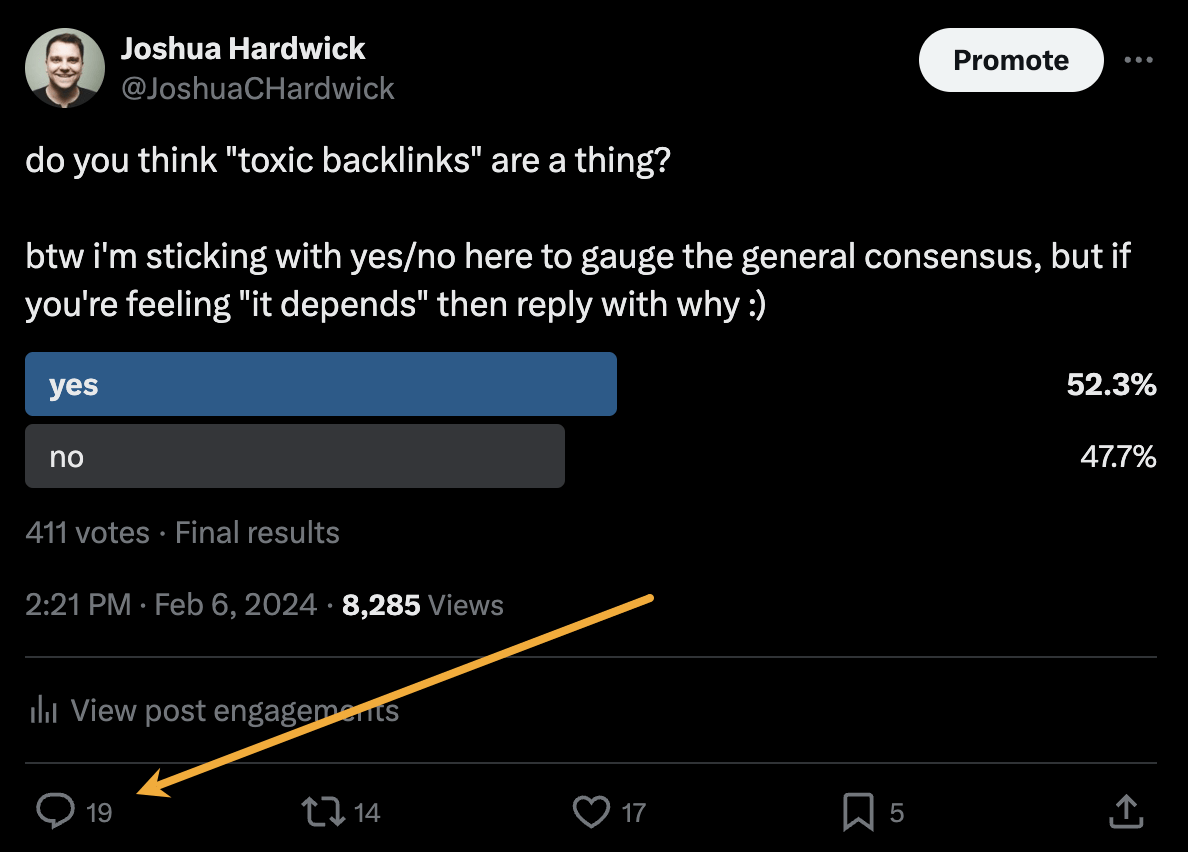

Either of these options is quicker than using HARO because you don’t have to sift through hundreds of responses looking for a needle in a haystack. If you disagree with me and still love HARO, feel free to tell me why on X 😉
SEO
Google Clarifies Vacation Rental Structured Data

Google’s structured data documentation for vacation rentals was recently updated to require more specific data in a change that is more of a clarification than it is a change in requirements. This change was made without any formal announcement or notation in the developer pages changelog.
Vacation Rentals Structured Data
These specific structured data types makes vacation rental information eligible for rich results that are specific to these kinds of rentals. However it’s not available to all websites. Vacation rental owners are required to be connected to a Google Technical Account Manager and have access to the Google Hotel Center platform.
VacationRental Structured Data Type Definitions
The primary changes were made to the structured data property type definitions where Google defines what the required and recommended property types are.
The changes to the documentation is in the section governing the Recommended properties and represents a clarification of the recommendations rather than a change in what Google requires.
The primary changes were made to the structured data type definitions where Google defines what the required and recommended property types are.
The changes to the documentation is in the section governing the Recommended properties and represents a clarification of the recommendations rather than a change in what Google requires.
Address Schema.org property
This is a subtle change but it’s important because it now represents a recommendation that requires more precise data.
This is what was recommended before:
“streetAddress”: “1600 Amphitheatre Pkwy.”
This is what it now recommends:
“streetAddress”: “1600 Amphitheatre Pkwy, Unit 6E”
Address Property Change Description
The most substantial change is to the description of what the “address” property is, becoming more descriptive and precise about what is recommended.
The description before the change:
PostalAddress
Information about the street address of the listing. Include all properties that apply to your country.
The description after the change:
PostalAddress
The full, physical location of the vacation rental.
Provide the street address, city, state or region, and postal code for the vacation rental. If applicable, provide the unit or apartment number.
Note that P.O. boxes or other mailing-only addresses are not considered full, physical addresses.
This is repeated in the section for address.streetAddress property
This is what it recommended before:
address.streetAddress Text
The full street address of your vacation listing.
And this is what it recommends now:
address.streetAddress Text
The full street address of your vacation listing, including the unit or apartment number if applicable.
Clarification And Not A Change
Although these updates don’t represent a change in Google’s guidance they are nonetheless important because they offer clearer guidance with less ambiguity as to what is recommended.
Read the updated structured data guidance:
Vacation rental (VacationRental) structured data
Featured Image by Shutterstock/New Africa
SEO
Google On Hyphens In Domain Names

Google’s John Mueller answered a question on Reddit about why people don’t use hyphens with domains and if there was something to be concerned about that they were missing.
Domain Names With Hyphens For SEO
I’ve been working online for 25 years and I remember when using hyphens in domains was something that affiliates did for SEO when Google was still influenced by keywords in the domain, URL, and basically keywords anywhere on the webpage. It wasn’t something that everyone did, it was mainly something that was popular with some affiliate marketers.
Another reason for choosing domain names with keywords in them was that site visitors tended to convert at a higher rate because the keywords essentially prequalified the site visitor. I know from experience how useful two-keyword domains (and one word domain names) are for conversions, as long as they didn’t have hyphens in them.
A consideration that caused hyphenated domain names to fall out of favor is that they have an untrustworthy appearance and that can work against conversion rates because trustworthiness is an important factor for conversions.
Lastly, hyphenated domain names look tacky. Why go with tacky when a brandable domain is easier for building trust and conversions?
Domain Name Question Asked On Reddit
This is the question asked on Reddit:
“Why don’t people use a lot of domains with hyphens? Is there something concerning about it? I understand when you tell it out loud people make miss hyphen in search.”
And this is Mueller’s response:
“It used to be that domain names with a lot of hyphens were considered (by users? or by SEOs assuming users would? it’s been a while) to be less serious – since they could imply that you weren’t able to get the domain name with fewer hyphens. Nowadays there are a lot of top-level-domains so it’s less of a thing.
My main recommendation is to pick something for the long run (assuming that’s what you’re aiming for), and not to be overly keyword focused (because life is too short to box yourself into a corner – make good things, course-correct over time, don’t let a domain-name limit what you do online). The web is full of awkward, keyword-focused short-lived low-effort takes made for SEO — make something truly awesome that people will ask for by name. If that takes a hyphen in the name – go for it.”
Pick A Domain Name That Can Grow
Mueller is right about picking a domain name that won’t lock your site into one topic. When a site grows in popularity the natural growth path is to expand the range of topics the site coves. But that’s hard to do when the domain is locked into one rigid keyword phrase. That’s one of the downsides of picking a “Best + keyword + reviews” domain, too. Those domains can’t grow bigger and look tacky, too.
That’s why I’ve always recommended brandable domains that are memorable and encourage trust in some way.
Read the post on Reddit:
Read Mueller’s response here.
Featured Image by Shutterstock/Benny Marty
-

 PPC7 days ago
PPC7 days agoA History of Google AdWords and Google Ads: Revolutionizing Digital Advertising & Marketing Since 2000
-

 WORDPRESS6 days ago
WORDPRESS6 days agoTurkish startup ikas attracts $20M for its e-commerce platform designed for small businesses
-

 MARKETING5 days ago
MARKETING5 days agoRoundel Media Studio: What to Expect From Target’s New Self-Service Platform
-

 SEO5 days ago
SEO5 days agoGoogle Limits News Links In California Over Proposed ‘Link Tax’ Law
-

 MARKETING6 days ago
MARKETING6 days agoUnlocking the Power of AI Transcription for Enhanced Content Marketing Strategies
-

 SEARCHENGINES6 days ago
SEARCHENGINES6 days agoGoogle Search Results Can Be Harmful & Dangerous In Some Cases
-
SEARCHENGINES5 days ago
Daily Search Forum Recap: April 12, 2024
-

 SEO4 days ago
SEO4 days ago10 Paid Search & PPC Planning Best Practices





You must be logged in to post a comment Login